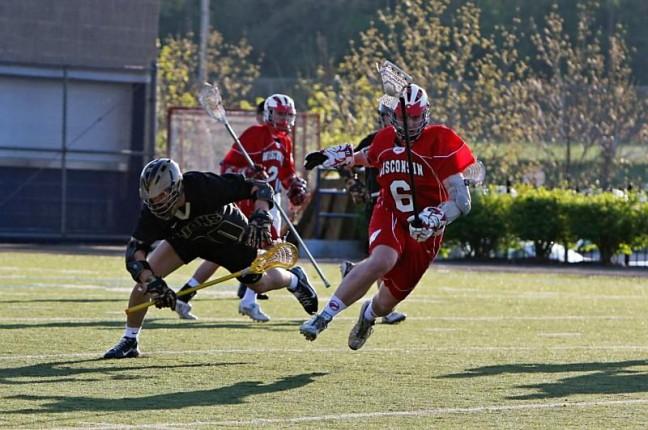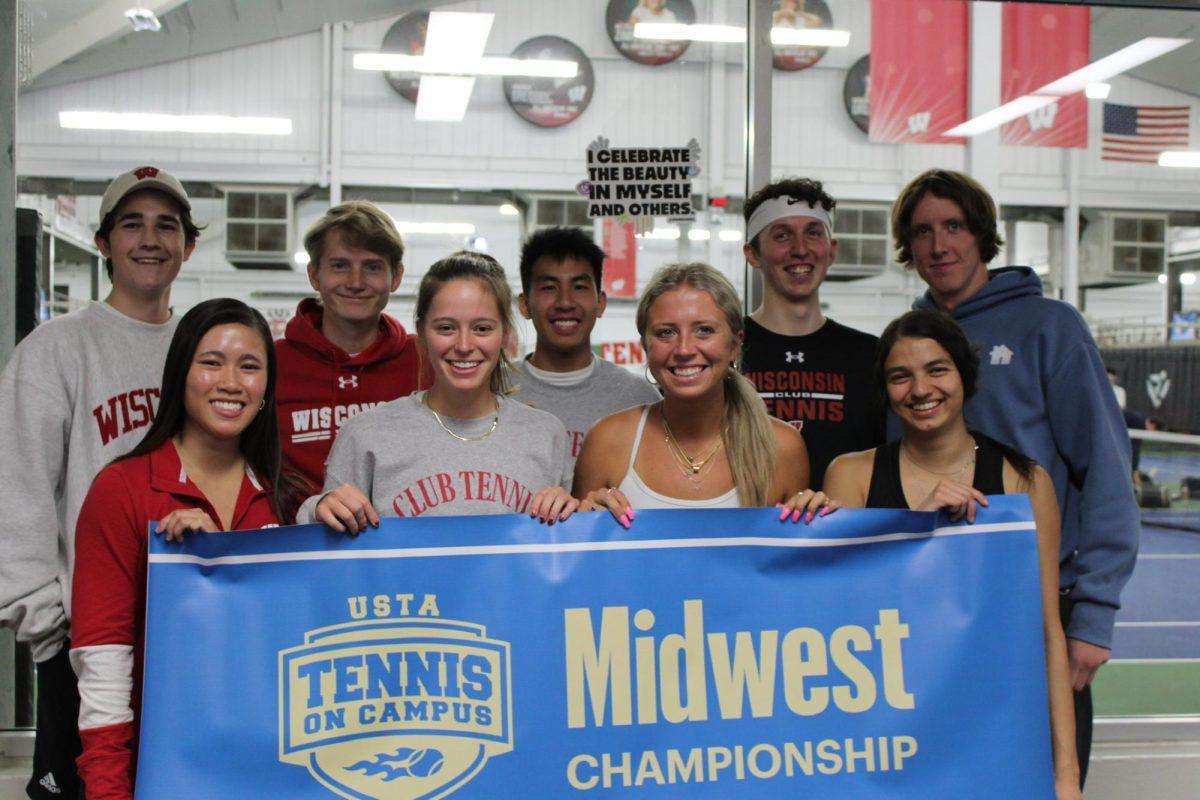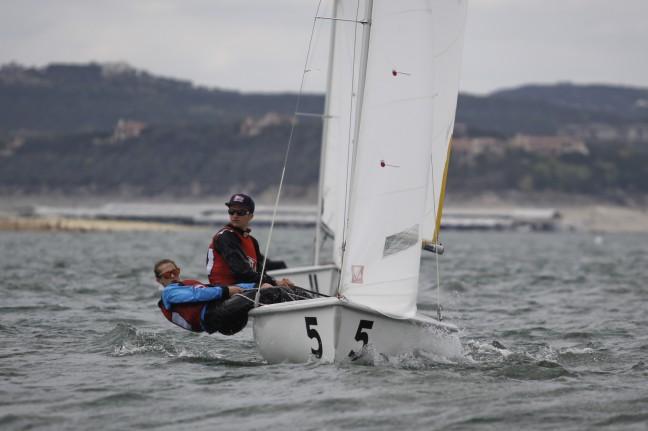A lot can happen in a year.
A Badger football team that was embarrassed in the Champs Sports Bowl can get redemption in the same game against a team everybody picked as the favorite. The Wisconsin men’s hockey team can go from missing the NCAA tournament by 0.0002 of an RPI point to being national runner-up. And in the case of the University of Wisconsin men’s club lacrosse team, you can go from playing scrubs in Platteville to playing Division I-caliber guys in Illinois.
The theme in 2010 for the Badger lacrosse team: “Welcome to the big leagues.”
Beginning with an application process last summer, UW made the jump to the Men’s Collegiate Lacrosse Association for this season. While there are numerous lacrosse leagues in the United States, the MCLA is the highest level of non-NCAA sanctioned competition, and it is home to big-name schools like reigning national champ Michigan, Brigham Young and Oregon, among others. Overall, 213 schools compete in the MCLA across 10 conferences.
For UW, which has had a club lacrosse program since 1978, it was a move a lot of people had been waiting for.
“There were actually stories done about us being the last major program to switch to the MCLA — the last big school,” UW senior captain Marcus Holzer said.
Prior to this season, the Badgers competed in the Great Lakes Lacrosse League, which consists primarily of smaller schools in the UW system and other schools in the region. As a team, Wisconsin agreed it wanted to commit more time and effort to the program.
“You can definitely tell that, moving from the GLLL to the MCLA, there are teams that are practicing every day, and they’re going out and working for two hours and a half, three hours every day,” Holzer said. “Where as in the GLLL, you can tell these kids are scrubs.”
That time commitment is the biggest thing the lacrosse team asks of its players. While two of UW’s club teams still compete in the GLLL, the only requirement for the MCLA team is the time commitment. Many of the team’s seniors and top players were unwilling to devote that time, which led to a small divide in the team.
“Going into the season, there were some questions… we lost a lot of our senior class who just didn’t want to do the extra stuff for one more year,” junior Matt Cutshall said.
For the players who chose to commit though, it’s paid off. In their first year of MCLA competition, the Badgers are 8-3, with a 4-2 mark in Great Rivers Lacrosse Conference play. UW heads to O’Fallon, Ill. this weekend for the conference tournament and a chance to earn a berth in the national tournament in Denver.
Holzer and Cutshall agreed a strong showing in the conference tournament would serve as “justification” to a season that almost never happened.
Not an easy road
In applying for admission to the MCLA, UW sent two representatives down to St. Charles, Mo. to give a presentation to the rest of the schools in the GRLC conference. As a student organization and club sport, the burden of working out schedules (50 potential schedules were drafted for the presentation), travel and other costs fell on the athletes themselves.
“A lot of this is because we’re a club sport [and] a student org. The administration really wants us to be in control of what we do,” senior Dan Jonas said. “It’s a lot more hands on, a lot more involved for people involved with it.”
The debate took place behind closed doors, although Cutshall and Jonas had an insider who informed them there was a negative attitude held by some schools about UW’s potential admission. Wisconsin just squeaked in by one vote.
Close call or not, the players agree one of the biggest boons is on the recruiting side — not just for the lacrosse team, but for the school in general. Many smart kids who play lacrosse, which is much bigger on the east coast, who want to continue playing might now consider Wisconsin.
“A lot of kids, because we didn’t have an MCLA team… I mean, half of the Minnesota team was kids from Madison who were lacrosse players,” Cutshall said. “And now, talking to their captain who was from Madison, he’s saying, ‘if this had been the case four years ago, there’s no question I would have come here instead of there.'”
And while the Badgers’ becoming part of the MCLA is a big step toward national prominence, there’s still work to be done. Wisconsin’s lacrosse team doesn’t get a lot of the same support MCLA giants like Michigan get. Cutshall, whose sisters are students at UM, said the Wolverines’ squad gets close to $100,000 from the school.
The Badgers get $2,000 a year from the school as a student org.
On the other hand, fees to play club lacrosse at Michigan can get up to $7,000 a year, way more than required to play for Wisconsin. Still, Cutshall calls the lack of financial support an Achilles’ heel for UW.
The biggest issue — more so than funding — is simply finding practice space. The lacrosse team was allowed to use the McClain field twice all winter and was forced to practice at the Middleton Sports and Fitness complex, at a rate of $150 an hour.
“I mean, it’s hard to even find a place to practice sometimes,” freshman Nick Klevay said. “Especially in the winter, we’re paying a shitload of money to play in Middleton, which is a drive and a half, and at 11 at night we’re having practice.”
“If we could get [the McClain] two or three times a week, it would be all the difference,” Cutshall said.
UW head coach George Counes — an unpaid position — agrees the lack of practice space is a problem, given the weather in Madison. The failure of the NatUp movement, which would have provided a home field and practice area for the team, was an especially hard blow to deal with.
“There just isn’t the facilities around to handle a spring sport with such a long winter,” Counes said. “It’s a very difficult thing to coach when you can’t get on a full field until you’re actually playing games.”
A bright future
Even with a lack of facilities and funding, the Badgers have a lot of factors in their favor, including youth. Being an MCLA program helps recruiting, which combined with UW’s academic reputation can help get guys like sophomore captain Zach Nichols, a former Division I player, who came here more for his education than lacrosse — the move to MCLA was a bonus. The Badgers are just as focused on academics, with a couple engineering majors and guys like Holzer, who will graduate from the business school in May.
Cutshall emphasized the support for the program has been picking up, from the Club Sports department to the administration. A chat with Chancellor Biddy Martin at the Champs Sports Bowl indicated to him the chancellor wants to see the program succeed.
“I thought that was a really positive sign, to talk to her and be able to see… that we do have support from the top,” he said.
Counes described the move to MCLA as similar to the ups and downs any first-year program has. Despite being in existence for over 30 years, the lacrosse team is still in the infancy of its next big step. Counes — currently the only coach — plans to build a staff for the fall, another step toward building a strong program.
“It’s just getting big right now, so it can only go up, I feel,” Klevay said. “That’s why I really look up to our seniors. They put in so much work this year, when they’re leaving next year.”
Holzer, who only got one year competing in the MCLA, is just glad to be playing meaningful games. He acknowledged the enthusiasm from the younger players to make the switch was a big part of the decision to go through with it. In addition to making the squad a more tight-knit group — more road trips and practices will do that to a team — his hopes for the future of the Badgers are simple.
“Just to be known as a program that’s legitimate, and (a team other) teams don’t want to play because they’re scared of us,” Holzer said. “That’s what I’d love to see the program go to.”













